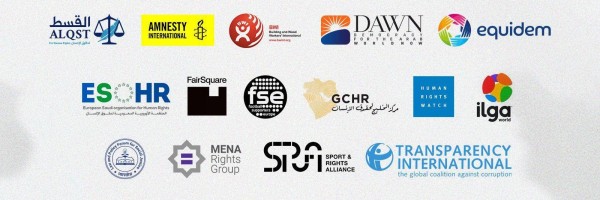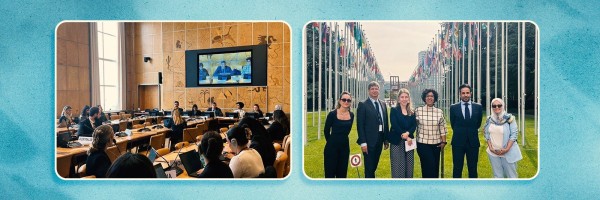Concerns over Saudi Arabia’s suitability to host the 2024 Internet Governance Forum (IGF) were confirmed last week, when two panel sessions that broached human rights issues were hacked and the content briefly deleted from the IGF website, and human rights materials were physically removed from an exhibition stand. ALQST was alarmed to see this apparent interference by the Saudi authorities and their attempts to censor the United Nations-sponsored gathering, held in Riyadh, Saudi Arabia, from 15-18 December 2024.
ALQST was one of more than 70 digital and human rights organisations that issued a joint appeal to UN Secretary-General António Guterres on 12 October 2023, calling for a reversal of the decision to hold the 2024 IGF in Saudi Arabia. We raised serious concerns about Saudi Arabia’s human rights record, stressing that this would create an unsafe environment for civil society to participate freely and securely. Regrettably, the events during the IGF this week prove these fears to have been well-founded.
Lina Alhathloul, ALQST’s Head of Monitoring and Advocacy, took part in a joint IGF session with Human Rights Watch (HRW) on the UN’s new cybercrime treaty remotely, because of the severe risks associated with her attending in person. Alhathloul’s family remain under an illegal travel ban, and her physical presence could have jeopardised her and their safety further. HRW drew attention to her absence by symbolically placing her name card in front of an empty chair. The session began with a minute’s silence for human rights defenders detained for online expression in Saudi Arabia and elsewhere in the Middle East.
During the session, participants discussed critical human rights issues in Saudi Arabia such as transnational repression, the use of spyware for cybersurveillance, State Security watchlists, and the 2018 assassination of Jamal Khashoggi. However, after the session concluded the video record was deleted from YouTube and the transcript removed from the IGF website. Although the content was later restored, the IGF Secretariat confirmed that pressure had been exerted to have it removed, an act that raises serious concerns about interference and censorship on the part of the Saudi authorities.
In a separate session organised by digital rights organisation Access Now, the Zoom platform was hacked, and pornographic content appeared on the screen, just after Khashoggi’s killing was mentioned. Although the actual perpetrators have not been identified, Saudi Arabia’s authorities bear responsibility for ensuring both online and offline security during events hosted within their jurisdiction. Notably, similar hacks have previously been documented during private NGO discussions of Saudi human rights violations.
Amnesty International, attending the IGF in person, hosted a stand with flyers highlighting the cases of Saudi women’s rights activist Manahel al-Otaibi and Angolan TikToker Neth Nahara, both detained for their online expression. Yet their materials were confiscated, undermining the organisation’s ability to raise awareness of critical human rights issues.
These incidents confirm earlier fears that Saudi Arabia was unfit to be chosen as host for a global, multistakeholder event that sets out to champion open dialogue and inclusive participation in Internet governance. The IGF’s mission to foster equitable and rights-based governance of the Internet will always risk being fundamentally undermined if hosted in an environment characterised by censorship, repression, and threats to personal safety.
We call on the IGF Secretariat and the United Nations to:
- Investigate all reported incidents transparently, including pressures to censor content and the disruption of online sessions.
- Clarify the extent of Saudi authorities' involvement in these abuses and ensure accountability for failures to maintain a secure and open forum.
- Establish stricter criteria for future hosts, ensuring that fundamental freedoms and civil society participation are safeguarded.
Internet governance cannot be meaningfully discussed in an oppressive environment. To maintain its credibility and purpose, the IGF must uphold its commitment to open dialogue, and resist hosting events in settings that stifle the very principles it seeks to promote.




